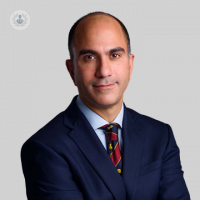When should I be worried about my nosebleed?
Escrito por:Do you currently experience nosebleeds on a frequent basis? If so, or even if you have wondered how serious they might be, our latest informative article may have all the answers you have been seeking.
Here, Mr Vikram Dhar, a revered consultant ENT and head and neck surgeon, reveals the most common causes of nosebleeds, when medical attention should be sought, and explains how stress can indeed sometimes cause nosebleeds.

What are the most common causes of nosebleeds?
Nosebleeds can happen for a variety of reasons. There are factors that affect the nose itself and factors that affect the whole body. Those that affect the whole body can include the blood being thin, either because you're taking medicines such as aspirin, clopidogrel, rivaroxaban, or warfarin, or the blood pressure, for example, is high.
Then, there are factors that affect the nose that could be caused by some trauma to the nose. We often see rugby players suffer from a nosebleed or even the occasional person that's picking their nose too much.
There are also certain conditions that affect the nose that can make the lining of the nose more irritated. Infections and vasculitis are just a few of a whole range of conditions that can cause the nose to bleed.
Can stress or being overtired cause nosebleeds?
As we know, in our stressful lives, certain behaviours and things that happen to our body can occur. Primarily, the issue with stress is that it raises our blood pressure, and, a bit like a plumbing system, if the pressure in the system is high and there's the potential of a leak somewhere, then a nosebleed can often ensue.
Of course, there are certain behaviours that we ourselves have. I'm sure I have certain habits and fidgets that could affect the nose, and I've certainly seen patients that play with their nose a little bit or pick their nose a bit too much.
Is it normal to have nosebleeds for no reason?
Yes, one can certainly suffer from a nosebleed for no apparent reason, but we will always thoroughly look for any underlying cause.
When are nosebleeds serious? When should I see a doctor?
Thankfully, the vast majority of the time, nosebleeds are fairly innocent and self-limiting. Of course, if a nosebleed doesn't stop, for example, after first aid measures after 15 minutes, and it's not stopped and the flow of blood is quite high, or you've got other co-morbidities, then, of course, you need to seek medical attention.
There are two timeframes that you need to see a doctor. Sometimes you need to see a doctor that day. In those cases, the nosebleeds are just not stopping. You are losing a lot of blood and you're not feeling very well, you're feeling lightheaded, and you feel like you're going to faint. There's a lot going down back into your throat or there's other co-morbidities going on. Then, in this scenario, you certainly you need to see a doctor that day.
Then, there's the intermittent troublesome nosebleed that happens every day or week or every few weeks. There's just no getting on top of it with simple measures, and, for these kinds of nosebleeds, you need to see a doctor on a more outpatient-appointment basis.
What should I do if I have a nosebleed?
This is a question I often get asked, and I'm always surprised how people often do something quite different. So, the first thing to do is to pinch your nose in the right place. Do not just pinch the bony part of those at the top, as that's not going to do anything. What we want to do is squeeze the nose.
You use your thumb and forefinger as far back as possible all around the nostrils and squeeze as tightly as comfortable and squeeze really hard for around 10 minutes. The next thing to do is not just lean back, because then the blood, which clots, will go into your throat and feel very uncomfortable. Instead, you want to lean forwards. The blood then starts to come out. The third thing to do is get some ice, and put it on the bridge of the nose to try to constrict the blood vessels.
Mr Vikram Dhar is a highly regarded ENT specialist who is an expert when it comes to nosebleeds. Book a consultation with him today via his Top Doctors profile.


